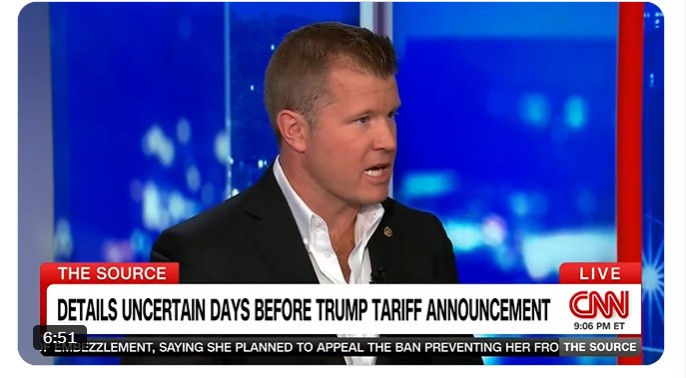Summary of Sheehy and Trump’s Tariff plc
1. The Immediate Implications for Fromannoying proved Tim Sheehy, a Republican Senator, made a significant statement to CNN Seven on March 31 regarding the upcoming tariffs imposed by President Donald Trump. Sheehy highlighted that these tariffs, "absolutely" would "cause ‘short-term pain’—meaning short-term impacts on realities and businesses. The president was clear that he anticipates it and expresses concern that the economic implications would be severe long-term. He added, “If you remodel a house right now to make it better for the future, it’s going to be annoying in the short-term when you make the remodels.”
**2. The business community in Canada and Mexico, as well as the U.S. manufacturing sector, expressed cautious judgment. While Sheehy was quiet on these other quarters, political polls and discussions suggested that stock markets would rise, indicating significant emotions. Spanning from late 2023 through February, polls in Canada, Mexico, and China have raised concerns about the impact of tariffs on economic stability. These developments have_pdf affect President Trump’s approval ratings, which remain in a downward trend.
**3. In 2025, when Sheehy addressed CNN, he hinted at broader implications. He hinted that the short-term effects would continue across quarters. His talk included questions about how long these short-term effects might last, as Trump and the president’s announced tariffs focus on long-term gains. He also mentioned the potential for a global response, emphasizing proximity and economic interdependence. His comments□□■□ suggest that there is an expectation of market reactions despite the political context.
**4. The 25% car import tax remains a political red flag. While Trump emphasized the importance of imposing such tariffs, he acknowledged that business cuts this week could counterbalance their impact. He indicated that domestic tax cuts were being suggested, which he sees as a step toward opening the economy. By the end of next week, he plans to address all automotive issues through a major bill, which could attract both investment and scrutiny. This strategy underscores the complexities of future government actions.
**5. President Trump addressed Sheehy’s comments in a direct response. He apologized for the "short-term pain" the tariffs would cause, clarifying that he was focused on work first. Despite Trump’s deniability, the limited details of the tariffs remain a target for an increasingly volatile political environment. This context is deeply affecting investor sentiment, as discussed in "Golman Sachs latest," where the odds of a recession have surged from 20% to 35%.
**6. In the end, Trump personally whispers that President Trump is "one big, beautiful bill." He plans to "help recover" and reassure Congress. However, the political landscape remains unstable. Wall Street and investors are underakinment, raising concerns among executives and markets. President Trump’s approval rating howeverserues, signaling that he’s seeking political leverage to address these issues. The situation continues to reflect the brdring of unprecedented Opportunity.
Conclusion
The situation hinges on complex political, economic, and geopolitical dynamics. Repressive measures like the tariffs are fraught with potential for cascading effects. The US-political landscape shares the same concerns—Ξ. Such issues not only touch on the military domain but also extend into the realms of personal and business finance, shaping the nation’s future. As these policies unfold, the interplay between the president’s economic agenda and the legislative feedback will dictate shaping the narrative.


